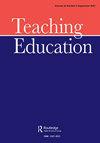实践中的差异化:对澳大利亚一所主流中学的探索性调查
IF 1.1
Q2 EDUCATION & EDUCATIONAL RESEARCH
引用次数: 2
摘要
本文章由计算机程序翻译,如有差异,请以英文原文为准。
Differentiation in practice: an exploratory investigation in an Australian mainstream secondary school
ABSTRACT This study is the second in a planned series of qualitative inquiries to investigate how some Australian educators use differentiated instruction (DI) in a secondary school setting. A small-scale study was conducted using individual, semi-structured interviews with seven teachers and two school leaders via Teams, a video conferencing platform. Using thematic analysis, two major themes were identified in the data, namely: perceptions of DI and key guiding DI principles. Results indicated that teachers and school leaders have a good understanding of differentiation and are responsive to the needs of the diversity of student abilities in this educational setting. This includes pedagogies such as designing learning activities to maximise educative opportunities for all students, pre-planning lessons and collecting student data to inform teachers’ understanding and capacity to plan for student readiness differences, using scaffolded formative and summative assessment, arranging flexible learning groups, and employing adaptable teaching processes that support all learners. The findings are a starting point to further explore and expand on how Australian educators use DI strategies and approaches in their mainstream schools.
求助全文
通过发布文献求助,成功后即可免费获取论文全文。
去求助
来源期刊

Teaching Education
EDUCATION & EDUCATIONAL RESEARCH-
CiteScore
3.80
自引率
6.20%
发文量
15
期刊介绍:
Teaching Education is an interdisciplinary forum for innovative practices and research in teacher education. Submission of manuscripts from educational researchers, teacher educators and practicing teachers is encouraged. Contributions are invited which address social and cultural, practical and theoretical aspects of teacher education in university-, college-, and school-based contexts. The journal’s focus is on the challenges and possibilities of rapid social and cultural change for teacher education and, more broadly, for the transformation of education. These challenges include: the impact of new cultures and globalisation on curriculum and pedagogy; new collaborations and partnerships between universities, schools and other social service agencies; the consequences of new community and family configurations for teachers’ work; generational and cultural change in schools and teacher education institutions; new technologies and education; and the impact of higher education policy and funding on teacher education. Manuscripts addressing critical and theory-based research or scholarly reflections and debate on contemporary issues related to teacher education, will be considered. Papers should attempt to present research, innovative theoretical and/or practical insights in relevant current literature and debate.
 求助内容:
求助内容: 应助结果提醒方式:
应助结果提醒方式:


